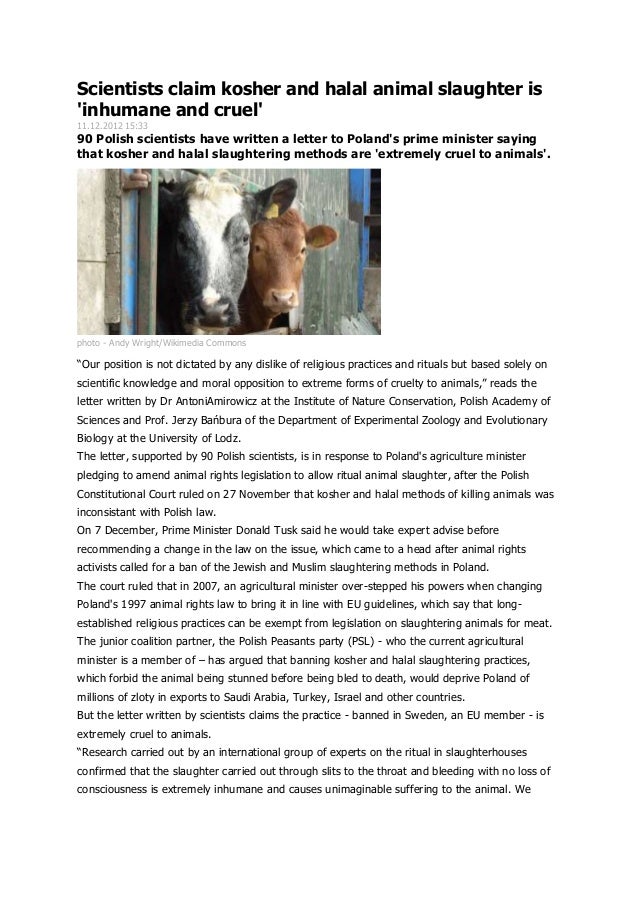In contemporary society, the intersection of religion and ethics is frequently scrutinized, particularly concerning customs that impact animal welfare. The practices of halal and kosher slaughter evoke considerable discourse on the matter of animal cruelty. These time-honored traditions are rooted in theological beliefs that mandate specific methods of animal slaughter deemed respectful and humane by practitioners. However, the scrutiny surrounding these practices increasingly attracts the attention of animal rights advocates, who raise critical inquiries regarding the ethical implications entwined within these rituals. Does the sanctity of religious observance surpass the ethical obligation to prevent animal suffering?
Halal and kosher slaughter originate from Islamic and Jewish tenets, respectively, and both emphasize the necessity for a swift, humane method of killing animals. These methods include the swift severing of the throat, windpipe, and blood vessels in the neck, ostensibly to ensure a painless death for the animal. Proponents argue that this technique leads to rapid loss of consciousness and subsequently minimizes suffering. Furthermore, the consumption of halal or kosher meat adheres to spiritual laws, fostering a deeper connection between food and faith.
However, this perspective is often challenged by those who advocate for animal rights. Critics assert that the rituals involved may inflict unnecessary distress. The principle underlying this objection lies in the assertion that any animal slaughter, regardless of the methodology employed, can lead to suffering and anxiety in the animal prior to death. The pre-slaughter process, which includes the transportation and handling of the animals, may further exacerbate their distress. Is it feasible that ritualized slaughter, despite its intention of being humane, inadvertently perpetuates a cycle of cruelty?
The ethical quandary becomes more pronounced when discussing the conditions under which animals are raised. Intensive farming practices dominate contemporary food production systems. These methods prioritize efficiency and profitability often at the expense of welfare. Animals raised in confined quarters experience immense stress and suffering long before they reach the slaughterhouse. Even within halal or kosher frameworks, the inhumane treatment accorded to livestock in factory farms may raise moral questions. Can one reconcile the practice of humane slaughter with the reality of inhumane living conditions?
Scientific examinations into animal sentience shed further light on this debate. Research indicates that animals possess a heightened capacity for suffering, demonstrating intricate emotional and social behaviors. These findings embolden arguments that challenge the validity of any form of slaughter, both traditional and modern. It can be argued that the act of killing an animal, regardless of how swiftly it is executed, fails to account for the broader moral implications concerning the rights and autonomy of sentient beings. When viewed through this lens, ritual slaughter raises serious ethical questions.
The dichotomy that arises is encapsulated in the balance of religious reverence against ethical scrutiny. To many practitioners, halal and kosher slaughter represents a sacred tradition that honors the sanctity of life. The act of slaughter is imbued with spiritual significance, designed to ensure the welfare of the animal and the purity of the meat. Conversely, proponents of animal rights contend that spirituality should not eclipse ethical considerations related to suffering and dignity. This clash of values positions halal and kosher practices under intense scrutiny.
Some have proposed reforms aimed at bridging the divide between religious observance and ethical treatment of animals. Suggestions include pre-stunning animals to alleviate pain during slaughter, thereby aligning traditional practices with modern expectations surrounding animal welfare. Advocates for these reforms maintain that it is entirely possible to adhere to religious principles while simultaneously recognizing the pressing moral obligation to prevent animal suffering. This compromise could pave the way for a kinder approach to longstanding traditions, fostering dialogue between religious communities and animal rights activists.
In light of these discussions, one may ponder the greater societal implications of these practices. As more individuals become aware of the complexities surrounding animal welfare, there is an increasing push toward transparency and accountability in food production. Consumers now seek assurances that ethical considerations are taken into account, regardless of religious connotation. This shift in consciousness encourages practitioners of halal and kosher slaughter to critically evaluate their methods in alignment with evolving social norms surrounding animal rights and welfare.
Ultimately, the question of whether halal or kosher slaughter equates to animal cruelty is not merely black and white. This complex issue necessitates a nuanced exploration of cultural traditions, ethical considerations, and the evolving understanding of animal sentience. As the conversation progresses, a collective examination of beliefs is warranted—one that seeks a harmonious balance between the observance of spiritual practices and a profound commitment to alleviating suffering.
In conclusion, the dialogue surrounding halal and kosher slaughter provides an opportunity for reflection on broader ethical paradigms within society. The movement towards recognizing animal rights transcends cultural and religious boundaries, fostering a more compassionate awareness concerning the treatment of all sentient beings. It is incumbent upon us to consider the implications of our choices, promote practices that prioritize welfare, and relinquish outdated customs that breed cruelty. Striving for advancements in the treatment of animals, while still honoring the importance of tradition, provides a forward-thinking pathway in the pursuit of an ethical existence.








